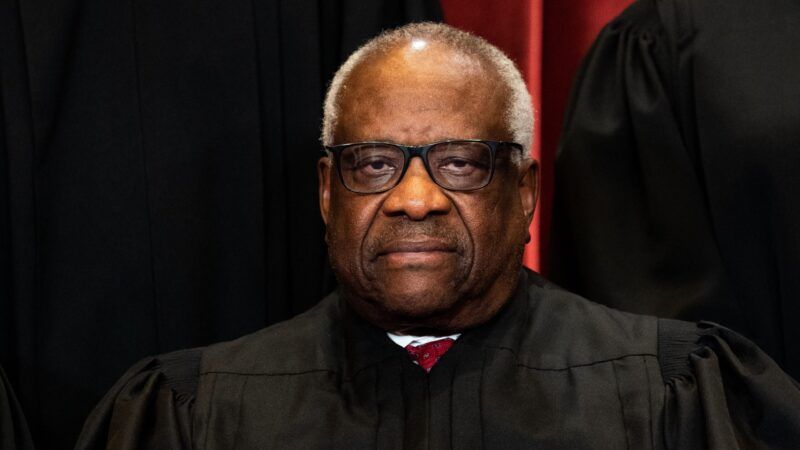George Washington University Officials Defend Clarence Thomas' Free Expression Rights
The university's own students are often not so lucky.

Officials at George Washington University announced this week that they would not remove Supreme Court Justice Clarence Thomas from the faculty at the university's law school. Thomas has lectured at the law school since 2011, co-teaching a constitutional law seminar. Following Thomas' vote in Dobbs v. Jackson Women's Health Organization, which overturned Roe v. Wade, John Kay, a rising junior at the university, began circulating a petition demanding that Thomas be removed from his post.
The petition, which now has over 9,000 signatures, argues that "with the recent Supreme Court decision that has stripped the right to bodily autonomy of people with wombs, and with his explicit intention to further strip the rights of queer people and remove the ability for people to practice safe sex without fear of pregnancy, it is evident that the employment of Clarence Thomas at George Washington University is completely unacceptable."
In an interview with The Hatchet, G.W.'s student newspaper, Kay said that "it's unacceptable that [Thomas is] on campus because this decision and then the three decisions that he's actively going after explicitly are actively endangering the lives of the students on campus."
On Tuesday, G.W. Provost Christopher Bracey and Law Dean Dayna Bowen Matthew sent a universitywide email announcing the school's intent to ignore calls to fire Thomas. The pair argued that "debate is an essential part of our University's academic and educational mission to train future leaders who are prepared to address the world's most urgent problems."
The university "will neither terminate Justice Thomas' employment nor cancel his class." The email also noted that Thomas' views "do not represent" the official views of the university.
Though this move is laudable, G.W. officials have not always been so consistent in their defense of free speech principles—at least not when it comes to defending students' rights.
In February, posters critical of the Chinese government appeared on the G.W. campus. The posters satirized the 2022 Olympics, which were hosted in Beijing, condemning the nation's human rights abuses. The posters were designed by Badiucao, a dissident Chinese artist based in Australia.
Students began filing complaints about the posters, alleging that the posters "[discriminated] against Asians," as one student group's letter claimed. The university quickly announced an investigation into the incident, seeking to find the students responsible for the flyers. In response to the incident, Mark Wrighton, the university's president, wrote that he was "personally offended" by the posters.
However, following involvement from the Foundation for Individual Rights and Expression (FIRE), and criticism from Sen. Marco Rubio (R–Fla.), the school backtracked and announced that it would not discipline those who distributed the posters.
Consistent support for free expression on campus is difficult to come by. It's one thing to publicly defend a Supreme Court justice when faced with public pressure. It's another to muster the courage to defend the rights of relatively powerless students when administrators are faced with the full force of their classmates' fury.
